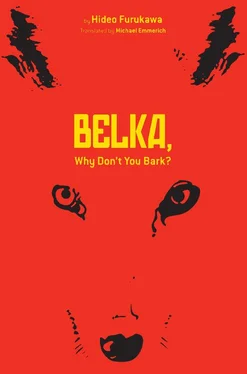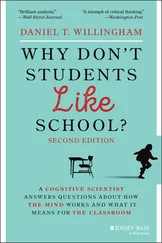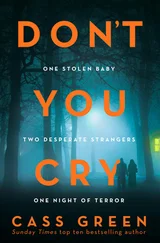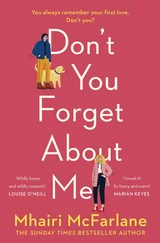Hideo Furukawa - Belka, Why Don't You Bark?
Здесь есть возможность читать онлайн «Hideo Furukawa - Belka, Why Don't You Bark?» весь текст электронной книги совершенно бесплатно (целиком полную версию без сокращений). В некоторых случаях можно слушать аудио, скачать через торрент в формате fb2 и присутствует краткое содержание. Город: San Francisco, Год выпуска: 2012, ISBN: 2012, Издательство: Haikasoru, Жанр: prose_magic, Современная проза, на английском языке. Описание произведения, (предисловие) а так же отзывы посетителей доступны на портале библиотеки ЛибКат.
- Название:Belka, Why Don't You Bark?
- Автор:
- Издательство:Haikasoru
- Жанр:
- Год:2012
- Город:San Francisco
- ISBN:978-1-4215-5089-3
- Рейтинг книги:4 / 5. Голосов: 1
-
Избранное:Добавить в избранное
- Отзывы:
-
Ваша оценка:
- 80
- 1
- 2
- 3
- 4
- 5
Belka, Why Don't You Bark?: краткое содержание, описание и аннотация
Предлагаем к чтению аннотацию, описание, краткое содержание или предисловие (зависит от того, что написал сам автор книги «Belka, Why Don't You Bark?»). Если вы не нашли необходимую информацию о книге — напишите в комментариях, мы постараемся отыскать её.
https://www.youtube.com/watch?v=ay_DcZ6RDFA https://www.youtube.com/watch?v=Orvqrqjk9pU
Belka, Why Don't You Bark? — читать онлайн бесплатно полную книгу (весь текст) целиком
Ниже представлен текст книги, разбитый по страницам. Система сохранения места последней прочитанной страницы, позволяет с удобством читать онлайн бесплатно книгу «Belka, Why Don't You Bark?», без необходимости каждый раз заново искать на чём Вы остановились. Поставьте закладку, и сможете в любой момент перейти на страницу, на которой закончили чтение.
Интервал:
Закладка:
You took shelter from the rain in the shade of a banyan tree.
You were facing the road.
You watched the road.
You stared at it as you had stared at the horizon. Your eyes were blank. You weren’t looking at anything in particular.
The road had two sides: a far side and a near side. Your empty gaze lingered on three dogs standing on the far side. A father and his children. You were new to the island; so were they.
The three dogs were about to cross the road, from that side to this side. To cut across it at an angle. The road was narrow. It wasn’t a highway. But still it had two sides, a near side and a far side, and to get from one to the other one had to cross it, like a river.
Seconds before your listless gaze took in the car, your ears had picked up the roaring of its engine. Then the car itself entered your field of vision. It was an expensive car: a Jaguar. The first sports car on the island. The driver, and owner, was a thirty-seven-year-old man who had made it big in the United Arab Emirates. He had paid for the car in US dollars and brought it ashore the day before, and now he was driving it in as flamboyant a manner as possible, showing off. Right now, he was pushing seventy miles per hour. Driving like a nut. You saw what was coming. Those three dogs were about to be run over. The father and his children. Three dogs, just like you.
Suddenly you were up and running.
Your premonition was confirmed by a noise. A shift in the sound of the engine. A sudden slamming of the brakes.
Something was moving you. CH… you were thinking. CH… CHILDREN!
The father was hit. So was one of the puppies. The two dogs were thrown together six feet into the air. The third dog was dangling by his neck from your mouth. You were on the far side of the road; you had run, and you had made it. You had… you had saved the puppy. You had been taught how to survive on a battlefield. You had almost been sent to the front lines in Southeast Asia, to fight the Vietcong. You had been awarded two medals for your outstanding service as a military dog: a Purple Heart and a Silver Star. The puppy you saved was smaller than his dad, but at six months old he was heavy enough. But you had saved him. An instant later, he would have been dead meat.
You shuddered. Somewhere inside, Goodnight, you were barking your pride.
There on the far side of the road, you set the puppy on the ground.
He was less a puppy, really, than a young dog. He was an odd-looking thing. His coat was brown, but he had six thin black stripes on one side and a black spot on his haunch. He looked a bit like a guitar. He was paralyzed with fear by the sudden catastrophe. But then he started walking. Gingerly, unsteadily. His father’s body, and his brother’s, lay sprawled on the asphalt. The Jaguar was long gone, of course. The driver didn’t hang around to pay his respects to the two dogs he had killed. He didn’t come to apologize to the child he had orphaned. Soon enough the dogs’ owner and his bodyguard would track him down and beat him half to death. But that was still several hours off. The time for that hadn’t yet arrived.
Right now, it was just the young dog who looked like a guitar peering down at two dead bodies. Tragedy. Trickling blood. It had happened so suddenly, this… death. The shock of it. The guitar dog had been through this once before. Only this time around, the number of dead had increased—doubled. This time it wasn’t just one dog stretched out on the ground, it was one plus one. It was two.
He backed away.
He sensed that he was losing them. He was scared. Terrified. He was being pushed back to his earliest memory, his first experience of fear.
He stepped back off the road. Onto the ground.
And there you were. You, Goodnight, were waiting. As the guitar dog backed away step by step from the bodies, he pushed slowly up against your warm body. Your fur was short, and under it was your skin. It was warm. Soft. The young dog was afraid of things that were cold and hard. And there you were.
He collapsed into you. Bam , just like that. He cuddled desperately against you. He needed to feel safe… truly safe. He nuzzled for your teats. He had responded in the same way to his mother’s body, but this time the infantile impulse was even stronger. You had teats. Five pairs of them, ten in all. They had never produced milk. But as he moved from the first to the second, the third, the fourth… each teat he tried exuded warmth. Living warmth.
So he pressed desperately against you and kept sucking.
And you understood.
I’M A MOTHER.
You felt it.
I’M SUCKLING HIM. HE IS MY CHILD.
Destiny was doing its work, and you were confused, you were reconstructing your memory. You had given birth to this child with the guitar-like stripes—he was yours. That was how you remembered it now. And so you told him: GO ON, SUCK. You gazed down at this mongrel who looked nothing like you, a purebred German shepherd, and you told him: GO ON, YES, DRINK MY MILK. In 1957, on the American mainland, another dog in the same situation had spoken those same words. At the edge of a highway in Wisconsin, another German shepherd had told seven mongrel puppies, monstrosity embodied, the same thing. You had no idea of this. No knowledge of that fact, no ability to grasp the connection.
You understood. MY CHILD HAS COME TO ME.
This scene took place in December 1975. Soon 1975 turned into 1976, which turned into 1977, which turned into 1978, which turned into 1979. And in December 1979, we come to the other big event. The second of the two strikingly similar wars that took place in the second half of the twentieth century. In April 1975, Saigon fell. That’s what had happened in Southeast Asia. The capital of South Vietnam was taken. The United States gave up supporting South Vietnam. And so, that same year, the first of the two limited wars, the one that has come to be known as the Vietnam War, came to an end. And so we move to Central Asia. December 1979: the USSR sent its army into Afghanistan. It decided to initiate “direct intervention” in a nation torn by civil war. The Soviet Union’s own ten-year quagmire had begun.
The Afghan War.
The fuse blew on December 25, 1979.
Another limited war, another offshoot of the Cold War. Obviously.
War number two.
And so, dogs—mother and child, as you had now become, incognizant incarnations of the circularity of time—where were you, four years later?
Woof, woof, woof!
A bright red, gaudily painted truck barreled along the highway that headed west out of Peshawar, the old capital of the North-West Frontier Province. It was a mile out of the city, then two, three, four, five miles. A gate appeared. A checkpoint. This was not a national border. Through this gate lay the Federally Administered Tribal Areas (FATA). Administered by the Pashtuns, the Tribal Areas were home to two and a half million people belonging to a number of tribes, each of which lived in accordance with its own Pashtunwali, an ethical code prescribing notions of warfare, loyalty, bravery, revenge, hospitality, the isolation of women, and so on. The land was populated by men with beards and veiled women. It was a region of steep hills whose major industries were the manufacture of weapons, smuggling, and farming illegal drugs. The truck drove into a village. It stopped. A dog leapt down from the bed. A second followed.
The first dog was about twenty-six inches tall with sinewy muscles and a fierce glitter in his eyes. His thick, short coat was brown, and he had a striking guitar-like pattern of stripes on one side. He had inherited the texture of his hair from his mother, a purebred Labrador retriever. His father’s father had been a purebred boxer. He himself belonged to no one breed, however. His blood was so mixed that all one could really say about him was that he was a mutt. Still, he had an air of tough, masculine power. Of unity… the odd sense of balance one feels when confronted with a monstrosity. Indeed, this dog had more than one mother. There was the mother who had given birth to him, and the mother who raised him. The dog who had jumped down out of the truck after him was his second mother.
Читать дальшеИнтервал:
Закладка:
Похожие книги на «Belka, Why Don't You Bark?»
Представляем Вашему вниманию похожие книги на «Belka, Why Don't You Bark?» списком для выбора. Мы отобрали схожую по названию и смыслу литературу в надежде предоставить читателям больше вариантов отыскать новые, интересные, ещё непрочитанные произведения.
Обсуждение, отзывы о книге «Belka, Why Don't You Bark?» и просто собственные мнения читателей. Оставьте ваши комментарии, напишите, что Вы думаете о произведении, его смысле или главных героях. Укажите что конкретно понравилось, а что нет, и почему Вы так считаете.












